Like 1776, 1789 and 1917, the year 1989 was one of those rare moments that mark a decisive turning point in human history. So, at least, it seemed at the time, especially to those of us who spent 1989 in the thick of the pro-democracy revolutions of communist central and eastern Europe, the FT’s Tony Barber writes:
Thirty years on, 1989 appears in less rosy colours. China’s modernisation has done nothing to soften the state’s authoritarian features. Russia, which appeared on a promising path to freedom in the Soviet Union’s final years, is an autocratic kleptocracy. Most countries in central and eastern Europe have been integrated into the EU and Nato, but the region abounds in nationalists, nativists and populists who have few values in common with the enlightened liberal revolutionaries of 1989.
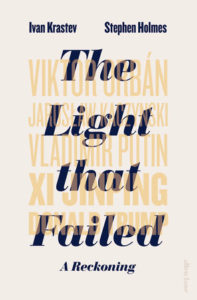 Western liberalism became soaked in complacency and arrogance after 1989, generating a backlash in the east’s new democracies and in the west itself, say Ivan Krastev (above), a Bulgarian-born scholar at the Institute for Human Sciences in Vienna, and Stephen Holmes, a professor at New York University School of Law, “Liberalism ended up the victim of its heralded success in the cold war . . . Liberalism fell in love with itself and lost its way,” they write in The Light that Failed, Barber adds:
Western liberalism became soaked in complacency and arrogance after 1989, generating a backlash in the east’s new democracies and in the west itself, say Ivan Krastev (above), a Bulgarian-born scholar at the Institute for Human Sciences in Vienna, and Stephen Holmes, a professor at New York University School of Law, “Liberalism ended up the victim of its heralded success in the cold war . . . Liberalism fell in love with itself and lost its way,” they write in The Light that Failed, Barber adds:
By the mid-2010s, the states of central and eastern Europe were undoubtedly wealthier and the capitalist future promised in 1989 had arrived — “but its benefits and burdens were unevenly, even crassly distributed”, they write. The region’s severe depopulation over the past 30 years exacerbates the problem as the emigration of young, well-educated people makes it harder for liberal parties to win elections. The authors are no admirers of Viktor Orban, Hungary’s illiberal prime minister — “he has shielded from public scrutiny both his electoral manipulation and epic levels of insider corruption” — but they warn that there is “scant reason for confidence that he is destined to fail”.

National Endowment for Democracy
Russia’s post-communist political elite “found faking democracy perfectly natural, since they had been faking communism for at least two decades before 1991”, they observe, adding that the supposed end of history turned out to be only the beginning of an Age of Imitation. The most powerful force behind the wave of populist xenophobia that began in Eastern Europe stems from resentment at the post-1989 imperative to become Westernized, Krastev and Holmes argue.
30 years after the revolutions in Central and Eastern Europe, the fall of the Soviet Union and of the Berlin Wall, [m]any of the countries in CEE proved to be models of excellence, champions of democratization and innovation, growing towards real economic convergence with the `old` countries in the EU, Euroacademia notes.* Others took a slower pace of gradual democratization mainly determined by external influence and benefits of European integration while still followed by the specters of corruption and inefficient economic development. Others were left out in limited impact vicinity agreements and slow pace of converging towards integration due to less credible incentives while some post-soviet republics receded in forms of authoritarianism and state capture.
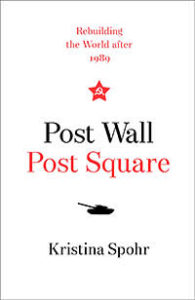 In Post Wall, Post Square, Kristina Spohr echoes Krastev and Holmes in arguing that western policymakers took it virtually for granted in 1989-92 that liberal democracy was the wave of the future and the world was converging on American values, the FT’s Barber adds.
In Post Wall, Post Square, Kristina Spohr echoes Krastev and Holmes in arguing that western policymakers took it virtually for granted in 1989-92 that liberal democracy was the wave of the future and the world was converging on American values, the FT’s Barber adds.
A history professor at the London School of Economics and Johns Hopkins University, Spohr uses recently declassified material in the British, French, German, Russian and US archives to describe how political leaders grappled with the revolutionary waves of change surging around them. “In retrospect, the whole Soviet bloc seems like a house of cards,” she writes. Yet at the start of 1989 very few people predicted that it would all come down by the year’s end. Crucial to the outcome was the restraint of Mikhail Gorbachev, the reformist Soviet leader. If only we had known at the time that he called Erich Honecker, East Germany’s reactionary communist leader, a “scumbag” [mudak] and that he dismissed Nicolae Ceausescu’s Romanian dictatorship as a “primitive phenomenon”.
As we approach the anniversary of the Fall of the Berlin Wall, Daniel Milo and Dominika Hajdu will offer a nuanced assessment of where Central Europe stands today and the challenges it confronts. They will present Globsec Trends 2019: Central & Eastern Europe 30 Years after the Fall of the Iron Curtain. Iulia Joja and Joanna Rohozinska will join them in a discussion on how the region perceives the fall of communism today, whether Central Europeans feel a part of the West, in what way do citizens view civil society, and what role Russia is playing in the region, among other topics.
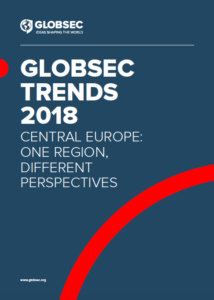 The National Endowment for Democracy invites you to a discussion of recent developments in Central Europe featuring a presentation* of the GLOBSEC Trends 2019 by
The National Endowment for Democracy invites you to a discussion of recent developments in Central Europe featuring a presentation* of the GLOBSEC Trends 2019 by
Daniel Milo, Head of Strategic Communication Program, GLOBSEC Policy Institute
Dominika Hajdu, Research Fellow, GLOBSEC Policy Institute
followed by a conversation with
Iulia Joja, Senior Researcher, Global Focus
Joanna Rohozinska, Senior Program Officer for Europe, National Endowment for Democracy
moderated by
Christopher Walker, Vice President for Studies and Analysis, National Endowment for Democracy
Thursday, October 24. 3:30 p.m.–5:00 p.m. 1025 F Street, N.W., Suite 800, Washington, DC 20004. RSVP
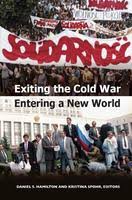 A new book – Exiting the Cold War, Entering a New World – explores how and why the dangerous yet seemingly durable world order forged during the Cold War collapsed in 1989, and how a new order was improvised out of its ruins, Johns Hopkins University SAIS adds. It is an unusual blend of memoirs by senior officials who were directly involved in the decisions of that time, and contributions by scholars who have been able to draw on newly declassified archival sources to revisit this challenging period.
A new book – Exiting the Cold War, Entering a New World – explores how and why the dangerous yet seemingly durable world order forged during the Cold War collapsed in 1989, and how a new order was improvised out of its ruins, Johns Hopkins University SAIS adds. It is an unusual blend of memoirs by senior officials who were directly involved in the decisions of that time, and contributions by scholars who have been able to draw on newly declassified archival sources to revisit this challenging period.
The Foreign Policy Institute and Henry A. Kissinger Center for Global Affairs at Johns Hopkins University SAIS cordially invite you to a discussion featuring
Horst Teltschik, Former National Security Advisor to Chancellor Helmut Kohl. Former Chairman, Munich Security Conference.
Mary Sarotte, Marie-Josée and Henry R. Kravis Distinguished Professor of Historical Studies, Henry A. Kissinger Center for Global Affairs, Johns Hopkins University SAIS. Author, The Collapse: The Accidental Opening of the Berlin Wall and 1989: The Struggle to Create Post-Cold War Europe
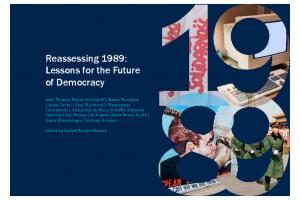 Kristina Spohr, Helmut Schmidt Distinguished Professor, Henry A. Kissinger Center for Global Affairs, Johns Hopkins University SAIS, Author, Post Wall, Post Square: Rebuilding the World after 1989 and Co-Editor, Open Door: NATO and Euro-Atlantic Security after the Cold War.
Kristina Spohr, Helmut Schmidt Distinguished Professor, Henry A. Kissinger Center for Global Affairs, Johns Hopkins University SAIS, Author, Post Wall, Post Square: Rebuilding the World after 1989 and Co-Editor, Open Door: NATO and Euro-Atlantic Security after the Cold War.
Daniel S. Hamilton, Austrian Marshall Plan Foundation Professor and Senior Fellow, Foreign Policy Institute, Johns Hopkins University SAIS. Author, Beyond Bonn: America and the Berlin Republic and Co-Editor, Open Door: NATO and Euro-Atlantic Security after the Cold War.
Philip Zelikow, White Burkett Miller Professor of History, University of Virginia, Former Counselor, U.S. Department of State, Author (with Condoleezza Rice), To Build a Better World: Choices to End the Cold War and Create a Global Commonwealth and Germany Unified and Europe Transformed: A Study in Statecraft.
Tuesday, October 22, 2019 10:30 AM – 12:00 PM RSVP. Kenney Auditorium, Johns Hopkins School of Advanced International Studies, 1740 Massachusetts Avenue, NW, Washington, DC 20036.
*Speaker Biographies
- Daniel Milo is Head of the Strategic Communication Program at the GLOBSEC Policy Institute in Slovakia. He holds a JD in criminal law from Comenius University. He previously served as head of a national anti-racist NGO in Slovakia, adviser to OSCE/ODIHR in Warsaw, and coordinator of anti-extremist policies in the Slovak Ministry of the Interior.
- Dominika Hajdu is Research Fellow at the GLOBSEC Policy Institute. She holds a MA in European Studies from the University of Leuven. She previously trained with the European Committee of the Regions and worked at the Foreign Policy Department in the Office of the President of the Slovak Republic.
- Iulia Joja is Senior Research at Global Focus in Romania and a Transatlantic Fellow at SAIS, Johns Hopkins University. She holds a PhD in Strategic Culture from NSPAS Bucharest and a MA in International Conflict Studies from Kings College. She also teaches at the Bucharest University of Economic Studies.
- Joanna Rohozinska is Senior Program Officer for Europe at the National Endowment for Democracy.
- Christopher Walker is Vice President for Studies and Analysis at the National Endowment for Democracy.
*Call for Conference Papers: 30 Years from the Revolutions in CEE: Assessing the Political Dynamics of an Invented Region







